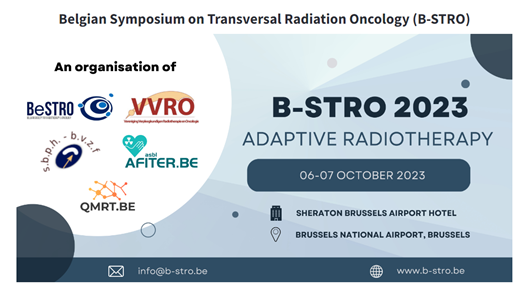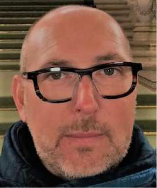
In 2019 and 2021, the different disciplines involved in Belgian radiation oncology (medical physicists, radiotherapists (RTTs), radiation oncologists and quality managers) joined forces to organise a symposium for all on radiotherapy. The resulting Belgian symposium on transversal radiation oncology (B-STRO) has become a great success.
The third edition of this joint meeting had as its main topic adaptive radiotherapy.
For the second time, the RTTs organised a pre-meeting course that took place in the hours before the congress began on October 6. Around 100 RTTs took part. We had several speakers in line with the topic of the conference and specifically with the advanced roles of RTTs. We also took time to reflect on topics that require our attention at a national level and that professional organisations are trying to discuss with the government based on their mandate.
Vision, strategy and action points of the three main national societies in which RTTs are represented (the Belgian Association of Radiotherapy and Oncology Nurses (VVRO), AFITER and VMBv) were presented by the chairs of the three societies. Filipa Sousa of the Institut Jules Bordet in Brussels introduced the result of her study on ‘The educational needs and Belgian framework for continuous education of RTTs’. We had a presentation from Lisanne Zwart about the advanced roles of RTTs within the radiotherapy department of the Hospital Medical Spectrum Twente in Enschede (The Netherlands). RTTs there were focused on the implementation of the Ethos system from Varian. Sophie Boisbouvier, an RTT at the Centre Léon Bérard in Lyon, gave a presentation about the advanced practice for RTTs in France.
We asked the expert of the US Federal Agency for Nuclear Control to explain the legal actions that result from the performance of our tasks, partly in view of changing technologies and the implementation of Ethos and MRLinacs, among others. We heard a fascinating and illuminating presentation, from which we can conclude that many legal adjustments are required if we are to carry out our tasks independently. We ended the session with two speakers from the high schools at which RTTs are trained, who explained how they adjust the programme to ensure that upcoming technologies are included in the teaching.
In the afternoon of this first day, we began the congress. We had several lectures about the two adaptive systems, MRLinac and Ethos, with a focus on patient flow and the different tasks per discipline. We also heard presentations about reactive adaptive radiation therapy and plan-of-the-day strategies. We ended with a reception, dinner and social evening.
The main focus of the second day was the parallel sessions per discipline. RTTs mostly took part in round tables in which colleagues from different centres were placed together. This made it interesting to discuss the prepared questions. After a short series of questions, we asked a representative from each table to summarise what the colleagues had discussed. It is nice when other colleagues pick up on what a group has said, because this leads to further discussion.
After lunch, we took some time to present lifetime achievement awards to colleagues from various disciplines who had made important impacts on radiotherapy in Belgium.
For the first time during this session of the conference, RTTs were able to submit abstracts. Each was read and scored by the scientific committee of the congress. Dylan Callens (UZ Leuven) received the prize for best RTT abstract: 'Development of e-learning programs as an additional tool in the training of RTTs within the department'.
The day ended with take-home messages from all different disciplines. We can look back on a successful conference, at which a large group of RTTs was present. We are already looking forward to 2025 for the next edition.

Ludwig Van den Berghe
Head of RTTs
Ghent University Hospital, Belgium